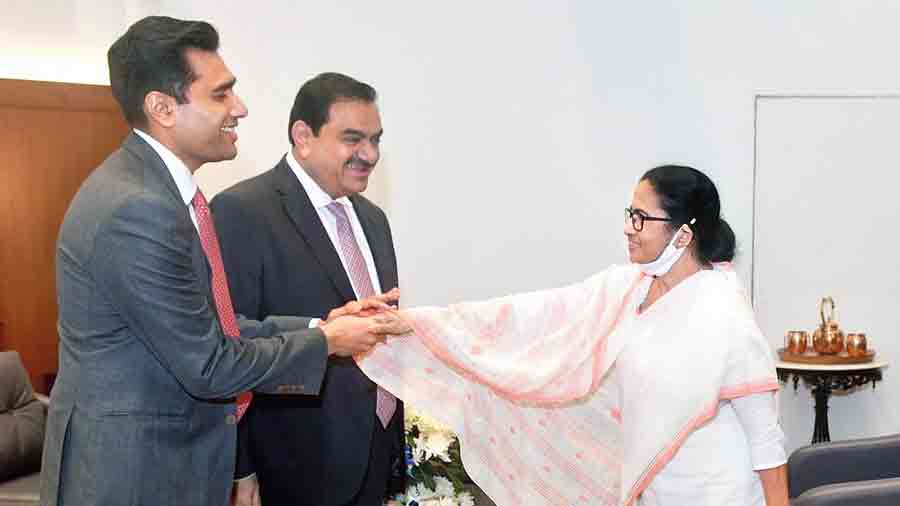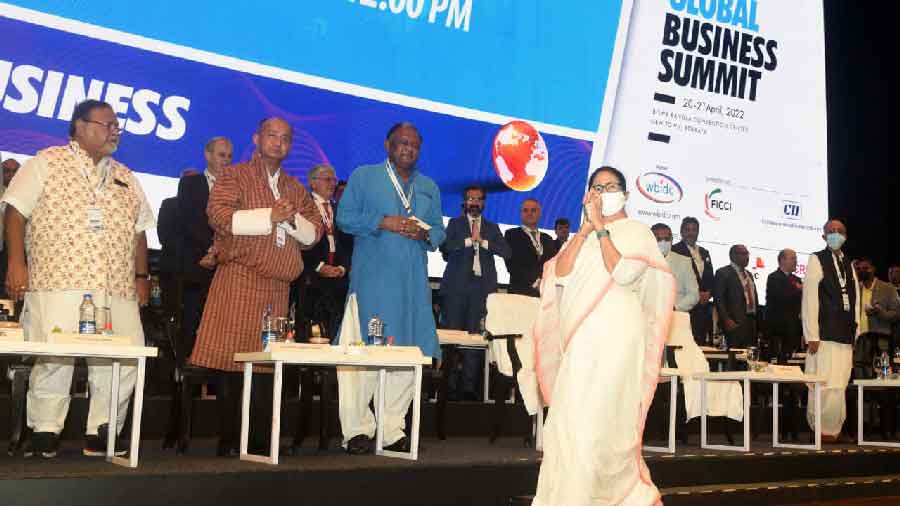Chief minister Mamata Banerjee on Tuesday advocated mutual cooperation with the Centre but made it a point to underscore one of the biggest concerns of India Inc by urging the Narendra Modi government not to disturb industrialists through central investigating agencies.
Towards the end of her address at the inaugural session of the sixth edition of the Bengal Global Business Summit, the chief minister requested governor Jagdeep Dhankhar, the representative of the Centre in the state, to communicate her message to New Delhi.
“Your excellency, please don’t mind, I have a word for you on behalf of all the industry…. I want you to tell Delhi that we want all the help from the centre. But please tell Delhi that industrialists should not be disturbed through agencies,” Mamata said, looking at the governor.
The audience erupted in applause after the chief minister wrapped up her speech with this message for New Delhi — an unmistakable indication that Mamata had struck a chord by publicly flagging what is often whispered in boardrooms and among C-suites.
The appreciation did not stop with claps alone. Several industrialists, who met the chief minister at the closed-door luncheon after the inauguration, thanked her for talking about an issue that most of corporate India usually keeps under wraps, sources said.
“Thank you, Didi, for the bold message…. There is no doubt that it’s going to be the headline in tomorrow’s papers,” a Mumbai-based businessman was overheard telling the chief minister.
Although Mamata made it clear that the central agencies are used for political purposes — a charge she levels at Delhi in her political rallies — the argument was aligned to her address, woven on the theme that good politics is the condition for good economics.
The chief minister took care to explain the various social welfare programmes -- ranging from the direct benefit transfer schemes for the disadvantaged sections of the society to the quality of life improvement initiatives in health and education -- that her government has undertaken over the past 11 years in an attempt to establish that she pursued a political path suitable for a country, like India, with many poor people.
Listing her government's priorities, she rolled out the eight pillars, where a commitment to develop world class infrastructure co-existed with providing an impetus on the right to education and social security of the underprivileged sections.
Speaker after speaker at the inaugural session hailed Mamata for her government’s welfare thrust.
“You are people-centric and schemes like Kanyashree bear the proof.… Your policies are making a difference in the lives of people and creating employment opportunities," said Sanjiv Mehta, CEO and managing director, Hindustan Unilever.
Several big names of Indian industry -- Gautam Adani of the Adani Group, Niranjan Hiranandani of the Hiranandani Group and Rishad Premji of Wipro -- echoed this view as they iterated their commitment to carry on with investments in Bengal because of the policies pursued by the state government.
Later in the day, a host of foreign envoys in India heaped praise on the chief minister for her pro-people policies.
While it is true that accolades alone cannot change the industrial situation in a state -- industrialists and diplomats are known for uttering please-all words -- and investment decisions depend on multiple factors, there is little doubt that the chief minister's earnestness in drawing investments to Bengalwas recognised by almost all speakers.
"These are difficult times for everyone and that's why it's difficult to predict how much she will succeed in her mission.... But full marks to her for her efforts, which are visible. I can't recall an instance where the two apex chambers, Ficci and CII, have come with their full force," said an industrialist on condition of anonymity.
The government's efforts have become the talking point among the participants in this edition of BGBS. Not just the courage to host a physical industry summit amid the pandemic has drawn applause, the new permanent fairground -- Biswa Bangla Mela Prangan, off EM Bypass -- has also raised the stature of the city in the eyes of the guests.
Some of the participants in the meet also spoke about the chief minister's commitment to secularism, which got captured in her address. Mamata said that she was not only keen on uniting the industries to invest in Bengal, she was also committed to ensure co-existence of "all religions, castes and creeds" in the state.
"I have done a lot in the social sector, now I am beginning my journey with the industry.… I hope more than 1.5 crore jobs will be generated in the next five years," said Mamata, referring to a list of areas that she hoped would be the game-changer in Bengal.
"The first will be the deep sea port in Tajpur, then the Eastern Freight Corridor, linking Amritsar and Dankuni, two major gas pipelines, the Deocha-Panchami coal mine and the IT sector,” she added.











